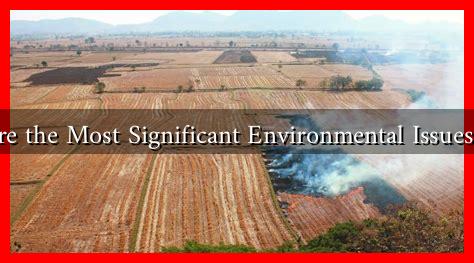-
Table of Contents
What Are the Most Significant Environmental Issues Today?
As we navigate through the 21st century, the planet faces a myriad of environmental challenges that threaten the delicate balance of ecosystems and human life. From climate change to biodiversity loss, these issues are interconnected and require urgent attention. This article explores some of the most significant environmental issues today, providing insights into their causes, impacts, and potential solutions.
1. Climate Change: The Overarching Crisis
Climate change is arguably the most pressing environmental issue of our time. Driven primarily by human activities such as burning fossil fuels, deforestation, and industrial processes, it leads to rising global temperatures, extreme weather events, and sea-level rise.
- Rising Temperatures: According to NASA, the global average temperature has increased by about 1.2 degrees Celsius since the late 19th century.
- Extreme Weather: The frequency and intensity of hurricanes, droughts, and floods have escalated, causing significant economic and human losses.
- Melting Ice Caps: The Arctic is warming at twice the global average, leading to the loss of habitat for polar bears and other species.
To combat climate change, international agreements like the Paris Agreement aim to limit global warming to well below 2 degrees Celsius. However, achieving these targets requires collective action from governments, businesses, and individuals.
2. Biodiversity Loss: The Silent Extinction
Biodiversity loss is another critical environmental issue, with species extinction occurring at an alarming rate. The World Wildlife Fund (WWF) reports that populations of vertebrate species have declined by an average of 68% since 1970.
- Habitat Destruction: Urbanization, agriculture, and deforestation are primary drivers of habitat loss.
- Pollution: Chemicals and plastics in ecosystems disrupt the health of various species.
- Climate Change: Altered habitats due to climate change further threaten species survival.
Conservation efforts, such as the establishment of protected areas and wildlife corridors, are essential to mitigate biodiversity loss. Organizations like the WWF work tirelessly to promote sustainable practices and protect endangered species.
3. Plastic Pollution: A Global Crisis
Plastic pollution has emerged as a significant environmental challenge, with millions of tons of plastic waste entering oceans and landfills each year. The United Nations estimates that about 13 million tons of plastic end up in the oceans annually, harming marine life and ecosystems.
- Marine Life: Sea turtles, birds, and fish often ingest plastic or become entangled, leading to injury or death.
- Microplastics: These tiny plastic particles have infiltrated food chains, posing health risks to humans and wildlife.
- Waste Management: Many countries struggle with inadequate waste management systems, exacerbating the plastic crisis.
Efforts to combat plastic pollution include bans on single-use plastics, increased recycling initiatives, and public awareness campaigns. The Plastic Pollution Coalition is one organization advocating for systemic change to reduce plastic waste.
4. Water Scarcity: A Looming Crisis
Water scarcity affects more than 2 billion people worldwide, with the situation expected to worsen due to climate change, population growth, and pollution. The United Nations warns that by 2025, two-thirds of the world’s population may face water-stressed conditions.
- Over-extraction: Unsustainable water extraction for agriculture and industry depletes freshwater resources.
- Pollution: Contaminated water sources pose health risks and reduce the availability of clean water.
- Climate Change: Altered precipitation patterns lead to droughts in some regions and flooding in others.
Innovative solutions such as rainwater harvesting, wastewater treatment, and sustainable agricultural practices are essential to address water scarcity. Organizations like UN Water are working to promote sustainable water management globally.
Conclusion: A Call to Action
The environmental issues we face today are complex and interlinked, requiring a multifaceted approach to address them effectively. Climate change, biodiversity loss, plastic pollution, and water scarcity are just a few of the significant challenges that demand immediate action. By raising awareness, supporting sustainable practices, and advocating for policy changes, individuals and communities can contribute to a healthier planet. The time to act is now; our future depends on it.

